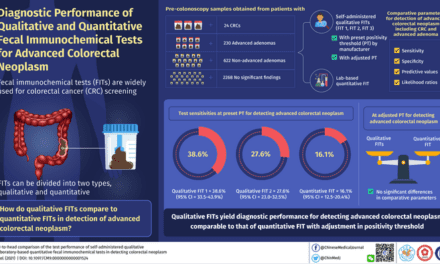Mainz Biomed, a molecular genetics diagnostic company specializing in the early detection of cancer, announced positive topline results from its ColoFuture study. The ColoFuture study is a multi-center international clinical trial assessing the potential to integrate a portfolio of novel gene expression (mRNA) biomarkers into ColoAlert, the company’s screening test for colorectal cancer (CRC) which is being commercialized across Europe and in select international territories.
The results of this groundbreaking study included sensitivity for colorectal cancer of 94% with a specificity of 97% and a sensitivity for advanced adenoma of 81%.
“The data generated from the ColoFuture study exceeded our expectations. As we look forward to publishing and presenting the full dataset at a forthcoming medical conference, we eagerly await the outcome from our eAArly DETECT clinical trial which remains on track to report results in Q4 of this year,” says Guido Baechler, CEO of Mainz Biomed.
The portfolio of mRNA biomarkers evaluated in the ColoFuture study was acquired from the Université de Sherbrooke (January 2022) to potentially enhance ColoAlert’s technical profile to further extend its capability to include the identification of advanced adenomas (AA), a type of pre-cancerous polyp often attributed to CRC, and to increase the diagnostic sensitivity and specificity rates for CRC.
Further reading: ACP Updates Colorectal Cancer Screening Guidance for Asymptomatic Adults
In Sherbrooke’s work, researchers tested a battery of novel transcriptional mRNA biomarkers using samples obtained from patients diagnosed with CRC or as having an advanced adenoma and identified a subset of mRNA biomarkers that provided the greatest sensitivity and specificity of detection (Herring et al. 2021). Mainz Biomed specifically selected those mRNA biomarkers which demonstrated not just the ability to detect a disease signal from samples of patients who were known to have colorectal cancer, but also the unique potential to identify a signal from samples of patients with advanced adenomas. The power to detect lesions in a pre-cancerous stage can change the entire CRC diagnostic landscape, the company says. If advanced adenomas are identified early, they are curable. By treating the patient before the polyps can progress to a cancerous stage, CRC can be prevented.
ColoFuture is an international clinical study evaluating the performance of the Mainz Biomed Colorectal Cancer Screening Test. This test is a combination of the ColoAlert test and novel mRNA markers. ColoFuture includes subjects aged 40-85 from participating centers in Germany, Norway and Denmark. Subjects are invited to participate in the study either when referred for colonoscopy (screening or diagnostic) or if already diagnosed with colorectal adenocarcinoma but treatment naive. To be included, subjects provide informed consent and submit samples from one stool collection prior to colonoscopy or treatment.
Completed subjects are placed into one of the following groups based on the colonoscopy results and any applicable pathology report from biopsy: colorectal adenocarcinoma, advanced precancerous lesions in the colon or rectum, non-advanced adenoma, or normal. Each subject’s stool sample is tested with the Mainz Biomed Colorectal Cancer Screening Test. The primary endpoints of the study are to determine sensitivity and specificity for colorectal adenocarcinoma. There are multiple secondary and exploratory endpoints including determining sensitivity and specificity for advanced precancerous lesions in the colon. The interim analysis included 220 subjects.





